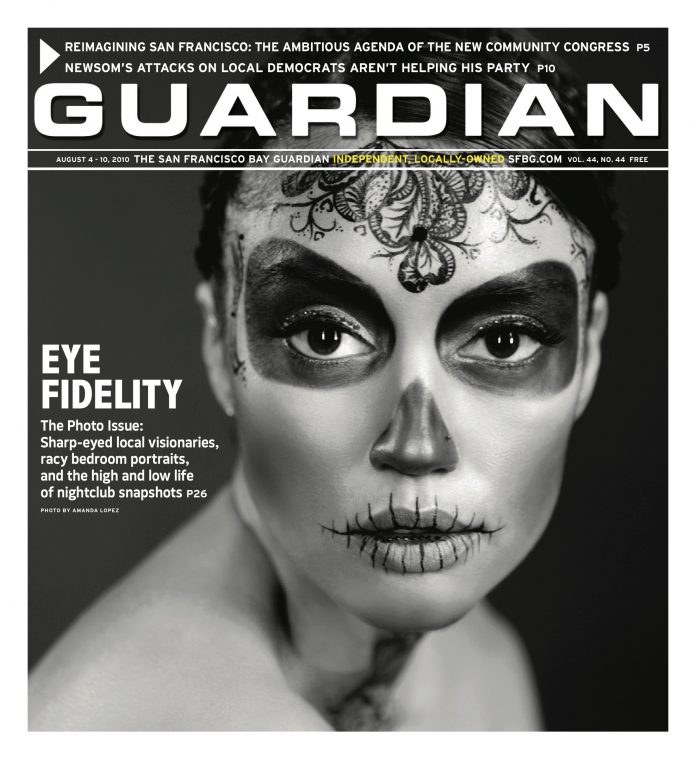arts@sfbg.com
FILM When Dennis Hopper died May 29 from prostate cancer, many obituaries — usually a place for polite, laundry-listed achievements — included unusually unflattering observations calling Hopper “difficult,” “unpredictable,” even “a pain in the ass.” It takes a lot to merit such treatment precisely when people are customarily at their most hypocritically respectful. But Hopper had about 55 years to drive directors, fellow actors, wives, friends, and sundry crazy.
The wild-man tendencies that made him a longtime hipster fan favorite also got him sued, blacklisted, and nearly killed. (An incensed John Wayne reportedly chased him with a gun on the set of 1969’s True Grit, likely not an isolated incident.) He burned though five marriages — one to The Mamas & The Papas’ Michelle Phillips lasting eight days — and was divorcing his longest-lasting latest wife on his deathbed, solely (she says) to disinherit her.
After years of world-class alcohol and drug abuse, he cleaned up in the early 1980s. At which point the hippie rebellion icon from Easy Rider (1969) became a Reagan Republican, dumping on the counterculture lifestyle he’d lived and promoted. Yet he remained a major avant-garde art collector, as well as a modernist painter and photographer of some repute. What’s not to like? Probably everything, given close proximity. Yet from a safe distance, Hopper somehow remained dead cool.
The Castro Theatre pays posthumous tribute with “Dennis Hopper: Misfits and Outsiders.” The five-day mini-retrospective strictly hits popular highlights: Rebel Without a Cause (1955) and Giant (1956), in which he appeared with James Dean (whose tic-ridden Method acting and unprofessional work habits were a major bad influence); the very dated Easy Rider, his hugely influential directorial debut; plus 1988’s Colors, the Sean Penn cops-vs.-gangs drama that commercially peaked a more mainstream return to the director’s chair.
There are also three disparate 1986 features that reignited his acting career: as harrowingly crazy Frank Booth in Blue Velvet (a role he told David Lynch he had to play because “it’s me”); the barely-less-freakish drug dealer in River’s Edge (facing off against spiritual heir Crispin Glover); and as a town drunk redeemed in inspirational sports drama Hoosiers. That last, natch, snagged his Oscar nomination.
Hopper undertook more villains in films like Speed (1994), Waterworld (1995), and Land of the Dead (2005). Plus recurring TV roles (24, Crash), voice work (videogames, cartoons) and just about any other job that fell into his lap, good or ill.
The Dennis Hopper retrospective I’d really like to see might, admittedly, roll tumbleweeds down the Castro’s aisles. But it would do the man’s crazier side, and craziest decade, justice. For during the 1970s, Hopper was basically a Hollywood outcast, roaming the globe in shambolic distress, choosing odd projects to bedevil. Every last one is interesting, eccentric, or simply unknowable.
His directorial career imploded in 1971 with endlessly delayed Easy Rider “follow-up” The Last Movie, possibly still the most experimental feature ever released by a major studio (an appalled MGM). Hopper then fell into French obscurities like 1972’s Crush Proof (costarring Pierre Clémenti … and Bo Diddley) and 1978’s Flesh Color (Veruschka and Bianca Jagger!) Good luck finding those.
He appeared in Orson Welles’ aborted final feature The Other Side of the Wind. In 1977 he played an unraveling Vietnam vet in pal Henry Jaglom’s still-most-serious first feature Tracks, then drove everyone nuts on-set as 19th-century Australian folk hero Mad Dog Morgan in Philippe Mora’s underrated 1976 film of that name. (Unfortunately it’s hard to see save in severely cut versions.)
He had a rare international success as a berserker edition of Patricia Highsmith’s sociopath Ripley in Wim Wenders’ breakout existential noir The American Friend (1977). Hopper sprang back into U.S. mainstream consciousness as another druggy nutjob — last stop before Brando’s black hole — in 1979’s Apocalypse Now. In all these he is a combustive element in a mad universe.
Equally if not more revealing are two little-known features also made on the cusp of the ’80s. Silvio Narizzano — a Canadian incongruously best known for Swinging London classic Georgy Girl (1966) — directed the incredible surreal tragicomedy Bloodbath, with Hopper as pathetic hippie-trail junkie “Chicken” and erstwhile Hollywood glamazon Carroll Baker as retired sex goddess “Treasure.” Both tempt doom, and get it, in a Spanish village that only tolerates Western decadence and wealth so far. Eventually Buñuel-type heavy symbolism requires a climactic slaughter both martyring and morally corrective. It’s amazing that a parable so thoroughly anti-bourgeoisie yet ruling-class paranoid — in short, so 1970 — was made as late as 1979.
Hopper often seems utterly mad, or at least mega-wasted, in that delirious film. Ditto 1980’s comparatively (barely) sober Out of the Blue, on which he was hired as actor but took over as director when the original one was fired. He plays a total fuckup just released from prison (having committed multiple manslaughter in a horrific school bus accident while drunk) who reunites with his drug-addicted wife (Sharon Farrell) and supremely alienated punk teen daughter CB (the extraordinary Linda Manz, from 1978’s Days of Heaven).
Out of the Blue offers genuinely shocking family dysfunction, as well as a little-heralded but great first-generation U.S. punk depiction. (Which nonetheless threads bits from the acoustic half of Hopper friend Neil Young’s Rust Never Sleeps through an eclectic soundtrack.) It’s terrific, exhilarating, arbitrary, and merciless. Apparently public domain, you can find it in DVD discount bins. Likewise Bloodbath, never released to DVD, can be had on used VHS for a couple of bucks online.
Those few dollars will get you closer to Hopper’s boastfully self-loathing perversity than anything on the Castro schedule. He might have been hell to work with — an easy rider who rode everyone else’s nerves raw — but the public expressions of his interior mess were always fun to watch.
DENNIS HOPPER: MISFITS AND OUTSIDERS
Wed/4-Fri/6 and Sun/8, $7.50–$10
Castro Theatre
429 Castro, SF
(415) 621-6120

